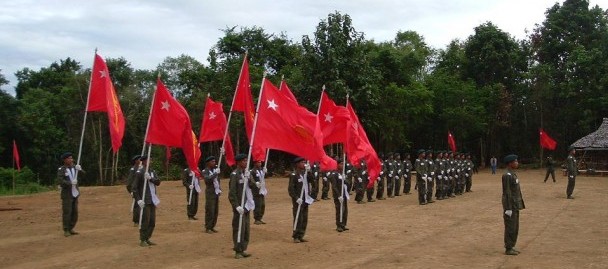The All Burma Students’ Democratic Front (ABSDF) has denied allegations in Burma’s state-run press that it was involved in a series of bombings, and said that the charges were not the reason for the group’s faltering peace negotiations with the Burmese government.
“These accusations are nothing new. It’s just the same old story,” said ABSDF Vice-Chairman Myo Win, referring to a report in the Myanmar Ahlin newspaper on Wednesday that said a member of the group had been arrested in connection with the blasts.
According to the government mouthpiece, “a suspect in the bomb blasts in Irrawaddy’s Hinzada and Myan Aung townships was captured in Mae Sot, a border town of Thailand, on May 11, 2012.”
The two explosions occurred several months apart—the first in November of last year, apparently targeting the local office of the ruling Union Solidarity and Development Party (USDP) in Myan Aung, and the second in March, when a bomb exploded near the Administrative Office in Hinzada.
The newspaper said the alleged bomber was a young member of the ABSDF.
The report comes at a time when the ABSDF is pursuing peace talks with Burma’s nominally civilian government. The group, which is also known as the Student Army, said negotiations were going well, but admitted that several planned meetings have been delayed.
The last round of talks took place in Rangoon in March, after a meeting with a government peace committee headed by former Industry Minister Aung Thaung, the month before. Since then, however, there has been no further progress.
The ABSDF insisted, however, that the talks were not stalled because of government distrust of the group. “The temporary postponement is because of changes in the government,” Salai Yaw Aung, a central committee member of ABSDF, told The Irrawaddy on Wednesday.
Last week, the government announced that it was forming a new peace team led by President Thein Sein. Previously, two separate teams—one led by Aung Thaung and the other by Railways Minister Aung Min—had been put in charge of negotiating with an array of armed groups based along Burma’s borders.
Vice President Sai Mauk Kham, an ethnic Shan, leads the new team’s working committee, which has 52 members, including members of Parliament, officers from the Burmese army’s divisional commands, and chief ministers from Burma’s states and division.
Aung Min remains a key negotiator, but notably absent from the new lineup is Aung Thaung, who headed the former Union-level peace team and who was responsible for talks with the Kachin Independence Army (KIA) and the ABSDF.
Noting that fighting has continued in Kachin State for nearly a year despite the talks, the ABSDF’s Salai Yaw Aung said the aim should be to reach a nationwide ceasefire.
“The ABSDF always welcomes and is ready for peace talks. We have been fighting for this [peace] for more than two decades,” he added.
The ABSDF was formed on the Thai-Burmese border by the students who took part in the 1988 nationwide pro-democracy uprising in Burma.

















